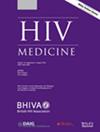Impact of COVID-19 and factors associated with long COVID and COVID-19 vaccine uptake in people with HIV in the United Kingdom: Results from Positive Voices 2022
Abstract
Objectives
We assessed the impact of COVID-19, and the prevalence and factors associated with a history of COVID-19 infection, long COVID and incomplete COVID-19 vaccine uptake among people with HIV.
Methods
Positive Voices 2022 is a questionnaire study of people accessing HIV care in the United Kingdom (March 2022–April 2023). Logistic regression assessed factors associated with a history of COVID-19 (previous positive test), long COVID among those with a history of COVID-19 (ongoing symptoms, with COVID-19 onset >3 months previously) and incomplete COVID-19 vaccine uptake (less than three doses of vaccine), adjusted for: age; gender; ethnicity; and year of HIV diagnosis.
Results
In all, 4188 participants were included. Commonly reported negative impacts of the pandemic were on social contact (44% of participants), mental health (30%), healthcare access (26%) and financial security (25%). Overall, 2068 of 4188 (49.4%) participants had a history of COVID-19. Of these, 10.8% met criteria for long COVID, associated with female gender, unemployment, financial hardship, earlier HIV diagnosis date, diabetes diagnosis, asthma/chronic obstructive pulmonary disease diagnosis, obesity and symptoms of depression and anxiety. Overall, 95.8% reported having at least one vaccine dose, but 649 (15.7%) participants had incomplete vaccine uptake, associated with younger age, female gender, Black African ethnicity, lower education, financial hardship, unemployment, multioccupancy household, more recent HIV diagnosis, detectable HIV viral load and symptoms of depression and anxiety.
Conclusions
About half of participants had a history of COVID-19, of whom 11% had persistent symptoms (long COVID). COVID-19 vaccine uptake was high, but incomplete uptake was apparent for 16% of participants and was more common among women, younger people, Black African individuals and those with socio-economic disadvantage.


 求助内容:
求助内容: 应助结果提醒方式:
应助结果提醒方式:


